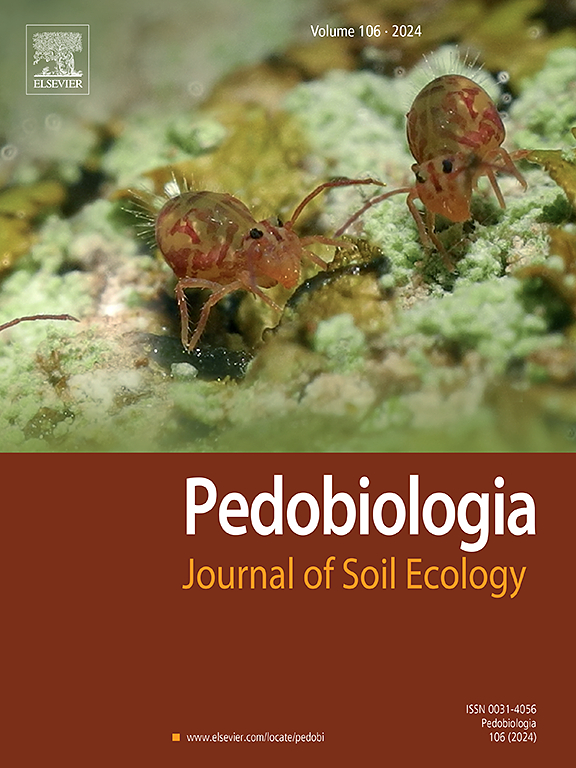Variations in soil fungal communities: Comparative insights from coniferous and mixed broadleaf-conifer forests
IF 2
3区 农林科学
Q3 ECOLOGY
引用次数: 0
Abstract
Soil fungal communities are intricately linked to their vegetative hosts, playing a crucial role in plant development, biogeochemical cycling, and the stability of forest ecosystems. Distinct forest types harbor unique soil fungal assemblages, each finely tuned to the prevailing environmental conditions and plant species, thereby fulfilling diverse ecological functions. This study used high-throughput sequencing methodologies to conduct an exhaustive assessment of the community structure, ecological process, and interaction networks of soil fungi within coniferous and mixed broadleaf-conifer forests. Our findings demonstrated significant differences in community structure across different functional groups (pathotroph, saprotroph, and symbiotroph) between mixed broadleaf-conifer forests and coniferous forests. The community structure of forest soil fungi was profoundly shaped by soil physicochemical attributes, including pH, organic matter, total phosphorus, and available nitrogen. The neutral community model indicated that stochastic processes were dominant in the structuring of fungal communities in both forest types; however, the proportion of deterministic processes was substantially greater in coniferous forests compared to mixed broadleaf-conifer forests. Furthermore, the soil fungal network structure in mixed broadleaf-conifer forests exhibited greater complexity compared to coniferous forests, with significant associations identified between specific soil physicochemical properties and the topological characteristics of fungal interaction networks in both forest types. These findings underscore the critical impact of forest type on the dynamics of soil fungal communities and their ecological functions, offering strategic insights for forest management practices that enhance ecosystem resilience and biodiversity conservation.
土壤真菌群落的变化:针叶林与阔叶-针叶混交林的比较研究
土壤真菌群落与其植被宿主有着错综复杂的联系,在植物生长发育、生物地球化学循环和森林生态系统的稳定性方面发挥着至关重要的作用。不同的森林类型蕴藏着独特的土壤真菌群落,每种真菌群落都与当时的环境条件和植物种类密切相关,从而发挥着不同的生态功能。本研究利用高通量测序方法对针叶林和阔叶-针叶混交林中土壤真菌的群落结构、生态过程和相互作用网络进行了详尽的评估。我们的研究结果表明,针阔叶混交林和针叶林中不同功能群(病原菌、嗜渍菌和共生菌)的群落结构存在显著差异。森林土壤真菌群落结构深受土壤理化属性(包括 pH 值、有机质、总磷和可利用氮)的影响。中性群落模型表明,随机过程在两种森林类型的真菌群落结构中都占主导地位;然而,与阔叶-针叶混交林相比,针叶林中确定性过程所占的比例要大得多。此外,与针叶林相比,阔叶-针叶混交林的土壤真菌网络结构表现出更大的复杂性,在两种森林类型中,特定的土壤理化性质与真菌相互作用网络的拓扑特征之间都存在显著的关联。这些发现强调了森林类型对土壤真菌群落动态及其生态功能的重要影响,为提高生态系统恢复能力和生物多样性保护的森林管理实践提供了战略性启示。
本文章由计算机程序翻译,如有差异,请以英文原文为准。
求助全文
约1分钟内获得全文
求助全文
来源期刊

Pedobiologia
环境科学-生态学
CiteScore
4.20
自引率
8.70%
发文量
38
审稿时长
64 days
期刊介绍:
Pedobiologia publishes peer reviewed articles describing original work in the field of soil ecology, which includes the study of soil organisms and their interactions with factors in their biotic and abiotic environments.
Analysis of biological structures, interactions, functions, and processes in soil is fundamental for understanding the dynamical nature of terrestrial ecosystems, a prerequisite for appropriate soil management. The scope of this journal consists of fundamental and applied aspects of soil ecology; key focal points include interactions among organisms in soil, organismal controls on soil processes, causes and consequences of soil biodiversity, and aboveground-belowground interactions.
We publish:
original research that tests clearly defined hypotheses addressing topics of current interest in soil ecology (including studies demonstrating nonsignificant effects);
descriptions of novel methodological approaches, or evaluations of current approaches, that address a clear need in soil ecology research;
innovative syntheses of the soil ecology literature, including metaanalyses, topical in depth reviews and short opinion/perspective pieces, and descriptions of original conceptual frameworks; and
short notes reporting novel observations of ecological significance.
 求助内容:
求助内容: 应助结果提醒方式:
应助结果提醒方式:


